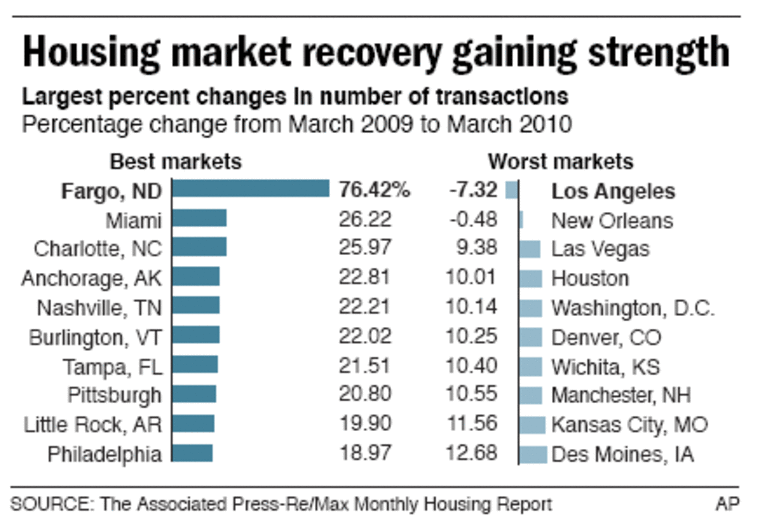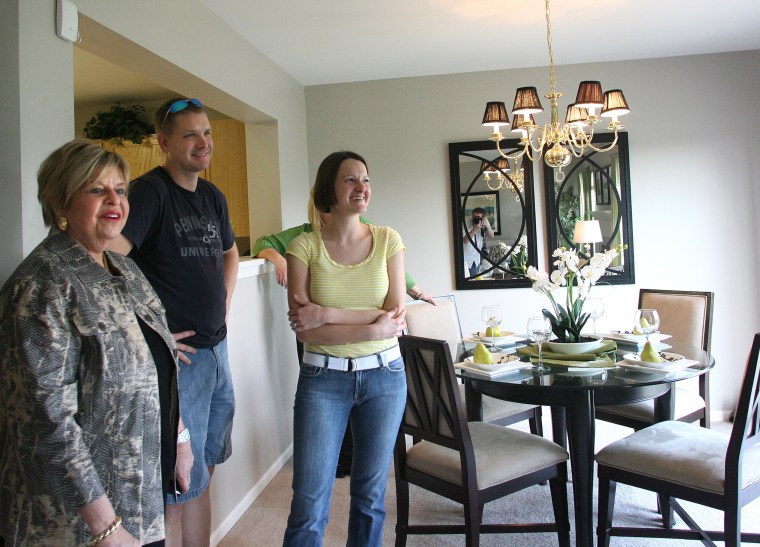You're finally ready to sell your house. But so are your neighbors and the couple down the street.
This means you have to work harder at it than just a few years ago when putting a "For Sale" sign on your lawn might have been enough. A slow economy and a record level of foreclosures have caused the supply of housing to exceed demand in many markets. So competition among sellers is fierce.
Patience helps, too. While there are signs of life in some markets, in others a single-family home that used to take 30 to 60 days to sell can languish for many months — if it sells at all.
Ultimately desperate measures may be required, including accepting a big loss to get a deal done.
But even in a challenging market, anybody's house can be sold, says Loren Keim, a real estate broker in Allentown, Pa., and adjunct real estate professor at Lehigh University.
Tell that to Brianne and Michael Smith of Plainfield, Ill. They've been trying to do everything by the book to sell their townhouse outside Chicago, short of holding a fire sale.
They spackled, painted and scoured the two-bedroom unit from top to bottom before listing it for $159,900 in January. The price was almost what then-single Brianne paid for the brand-new home in 2002.
And the couple promoted the sale through a real estate agent. "LOCATION LOCATION LOCATION!" says the online listing. "SPACIOUS DINING ROOM PERFECT FOR ENTERTAINING! KITCHEN HAS PANTRY AND LOTS OF CABINETRY! FULL BASEMENT READY FOR YOUR IDEAS! PRICED TO MOVE!"
But in a market glutted with townhomes, they've gone three months without an offer. Meanwhile, they sit across town in a new home, juggling two mortgages.
"People are only buying the ridiculous deals right now," says Michael, 36, an operations supervisor for an oil refinery. "We got the good from this market (as buyers), and now we're getting the bad."
This is the story how do you sell in a buyer's market?

"There's a zillion townhouses on the (local) market right now; that's the problem," says Rosemary West of ReMax International, the Smiths' agent. "We can't change that."
But there are things you can control. Here's a look at the rules of home-selling in the post-bubble era.
Do I hire a broker?
It may be tempting to avoid the 5 to 7 percent sales commission that brokers charge. About 11 percent of homes sold without a broker in 2009, according to the National Association of Realtors.
But think hard about going this route unless you have a buyer already lined up.
Homeowners selling on their own also can't advertise on the popular online sites, such as Realtor.com, Trulia, MSN Real Estate and Yahoo Real Estate. Such sellers may be limited to listing on FSBO.com or in the local newspaper.
(Msnbc.com is a joint venture of Microsoft and NBC Universal.)
You'll also need to handle everything from advertising to negotiating the deal. What's more, you must be available for frequent showings, and you'll have to know what's going on in the local marketplace.
"Our decision to hire a real estate agent was really all about the work involved," says Brianne, a mechanical engineer. "And also with the market being what it is, to lose out on the advertising that you can get by hiring an agent seemed kind of a silly move."
What do I repair?
Fix or replace anything that's broken, leaking or cracked. And don't let little items go unfixed, figuring no one will notice.
"To get top dollar for the property in this market, do as much as you can," says Keim, author of "How to Sell Your Home in Any Market."
Make sure there are no problems with the roof, foundation, windows, screens, heating and air conditioning system, plumbing, appliances or yard. Oil squeaky doors, replace worn faucet fixtures, patch cracks in the walls, replace bad flooring, fix light switches, and paint the house trim.
Consider paying $250 to $600 for a preemptive home inspection to learn of deficiencies that the buyer's inspection would turn up.
If you're not a do-it-yourselfer, hire a handyman. Don't be cheap. A buyer's offer that's lowered by your home's shortcomings may cost you more than the repairs would have.
Such efforts as spending $30 on a gallon of paint and repainting a room yourself can pay off many times over. A buyer may otherwise dock an offer by $1,000 or $2,000 for the headache of having to hire someone to do it.
In the Smiths' case, no repairs were necessary to a townhouse still less than a decade old.
How do I set the price?
Set the price low if you want your house to move.
You and your real estate agent should check online to see what buyers have paid recently for homes similar to yours. That's often a better gauge than the list prices of houses still on the market, because many of those won't sell in a slow environment.
West, the Smiths' broker, studies how long it takes properties to sell, time on the market, as well as recent sales volume, list prices of comparable homes, foreclosures and short sales. "You have to adapt to the market," she says.
Keep your emotions out of it. Sure, maybe your house has extra storage racks in the closets or other pluses. But if the neighbors have granite countertops or other popular features that add value and you don't, their house is going to sell for more.
Leave room for negotiation. Buyers expect you to come down in price and may cite the cost of extra work needed on the house to insist on it.
And remember, homes that sell faster reap higher sales prices in the end.
"Every week that the house is on the market, it grows more and more vulnerable and the buyer pool grows more and more emboldened to pay less," says Katie Severance, a broker for ReMax in Upper Montclair, N.J., and co-author of "The Complete Idiot's Guide To Selling Your Home."
It's a tough balancing act for couples like the Smiths. They just lowered their price by $5,000 to lure buyers. But if they have to wait much longer, they may pull the townhouse off the market and rent it rather than drop the price again significantly.
"We don't want it to sit on the market forever and ever but we don't want to give it away either," says Brianne.
How do I dress up my house?
Presentation is critical in a buyer's market. That means not only showcasing a spotless house but dressing it up to stand out from the competition.
Consider the curb appeal — a home shopper's first impression in pulling up out front. Do what you can to spruce up the exterior.
On the interior, eliminate clutter, wash all floors and bathroom tiles, shampoo the carpets, and clean out the closets, basement, attic and garage. Apply a fresh coat of paint, in neutral colors, to the most used areas and let in as much as light as possible.
Depersonalize the house so buyers can envision themselves living there. Remove framed family photographs of weddings, graduations and your kid's soccer game; put away vacation mementos and political or religious items; think bed-and-breakfast decor.
Stage the rooms to appeal to prospective buyers — rearrange or remove pieces of furniture to highlight the best features and redirect eyes away from weak spots. Consider hiring a professional. A consultation costs $150 or more, and staging typically runs $1,500 or more for an occupied house and at least $2,500 for a vacant house.
The Associated Press paired the Smiths with a professional home stager. Margaret Gehr and four employees swept through their townhouse last week, adding furniture, art works and pizzazz.
"It's like a beauty contest," says Gehr, who owns Re-Arrange It Interiors in Plainfield. "The best-looking homes sell faster, and often for a higher price."
To bring the vacant property to life, the white walls were painted a more striking but still neutral gray, and the townhouse was made over in a contemporary style to target younger buyers. Gehr added a sofa, patterned chairs, a glass coffee table, framed art and a potted plant to the living room.
The dining room was staged with chairs and an artfully set table, ceiling lamp and two large mirrors to magnify the size. And flowers and a display of Pellegrino mineral water added flair to the kitchen.
"We go for a model home sort of look," Gehr says. "So, a lot of lifestyle elements to help buyers see what it's like to live in the house."
The $2,500 worth of staging work she donated gave the no-longer-empty property a warm, homey feel, and left the couple optimistic that buyers would soon emerge.
How do you avoid two mortgages?
Although it's advisable to do everything you can to sell your home before you buy another, it may not always be possible. For example, relocating for a job might force your hand.
If you're facing this situation there are financing options, though they're harder to come by since the housing crisis.
One of the least expensive options is to borrow money through a home equity line of credit on your old home. But be aware that this credit line must be in place before you put your home on the market. Even so, lenders may balk at your taking on the debt because of declining home values in many markets.
The old option of a bridge loan — to cover the cost of a down payment before you close on a new home — has largely vanished in this market because banks find them too risky.
Ultimately it may be safest to consider renting a new home until the old home is sold and your financing is readily available to make a purchase.
The Smiths have been gritting their teeth and paying two mortgages since January — $2,400 for the new house and $1,000 for the old one. They can manage it because both have good-paying jobs, and they remain reluctant to let the townhouse go for a rock-bottom price. But it handcuffs them a bit.
"It's not ideal," Brianne says. "I'd like to have my $1,000 (a month) back!"
